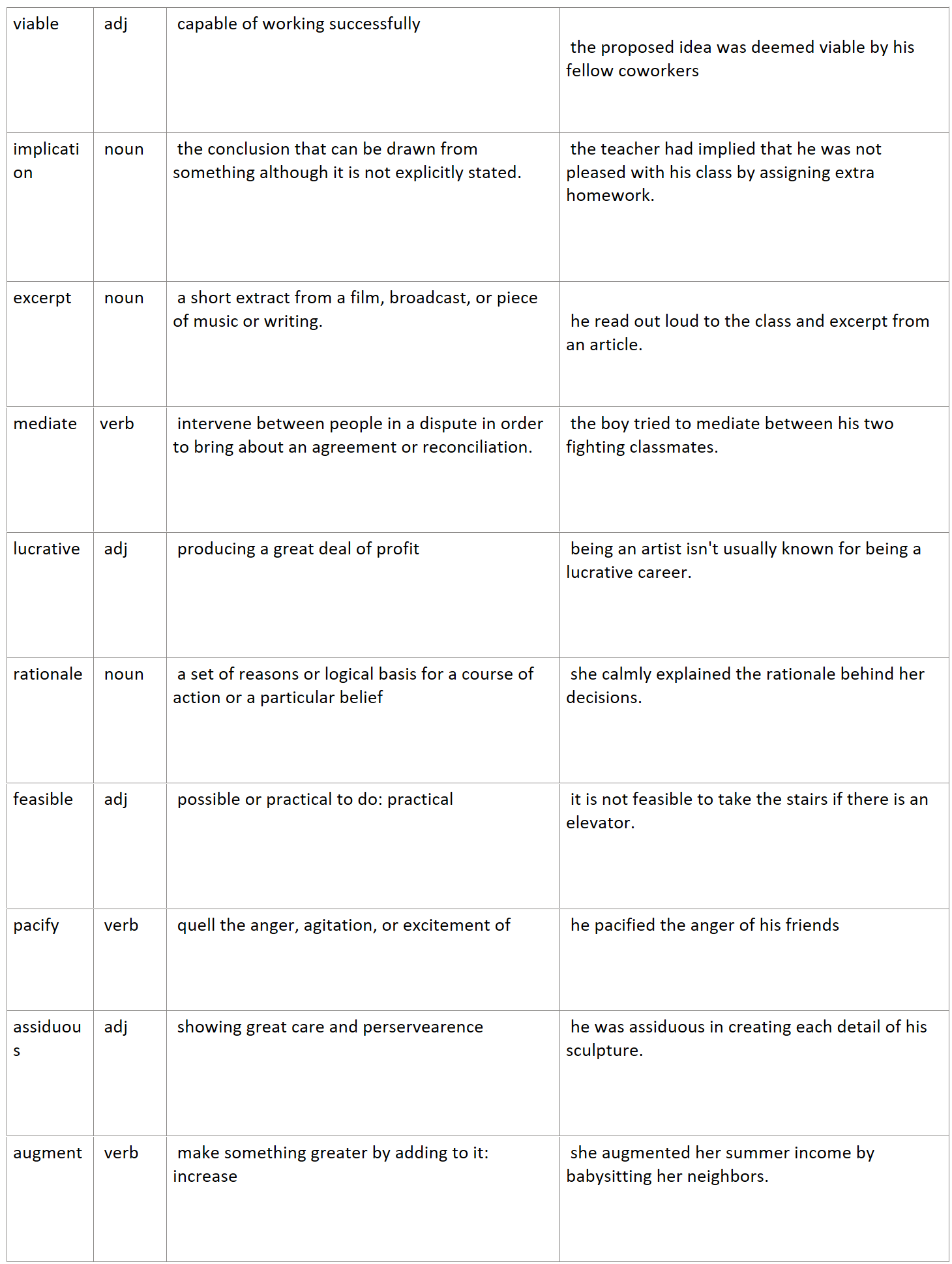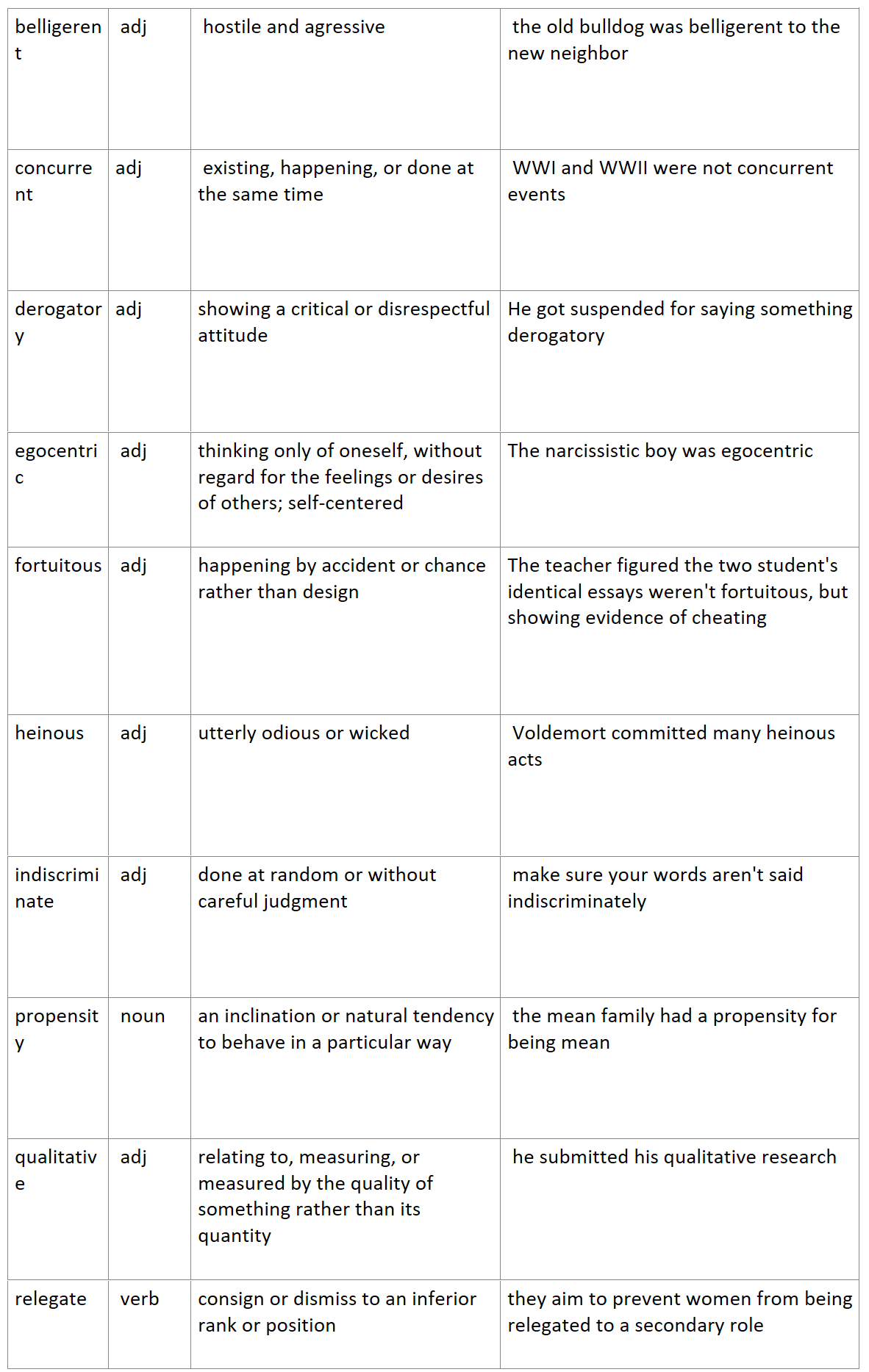english S1 exam vocab
expound | verb | Present and explain a theory or idea systematically and in detail | She expounded the history of the US to her class
|
malevolent | adjective | Having or showing a wish to do evil to others | He had dark, malevolent eyes.
|
succumb | verb | To fail to resist pressure, temptation, or some other negative force. | She became the newest succumb to the trend
|
tonic | noun | A medicinal substance taken to give a feeling or vigor or well-being | He took the tonic to feel better.
|
translucent | adjective | A substance allowing light, but not detailed shapes, to pass through; semitransparent. | The tinted glass was made from a transparent material
|
gallows | noun | A structure, typically of two uprights and a crosspiece, for the hanging of criminals | The evil criminal was escorted to the gallows.
|
kettle | noun | A container or device in which water is bottles, having a lid spout, and handle; a teakettle | She placed the silver kettle on the stove.
|
jetty | noun | A landing stage or small pier at which boats can dock or be moored | He jumped from the boat to the small, wooden jetty
|
daintily | adjective | Delicately small and pretty | Miss Strangeworth walked daintily down the sidewalk into town.
|
inscrutable | adjective | Impossible to understand or interpert | She squinted confusedly at her student's inscrutable handwriting.
|
condemnation | noun | the act of condemning, a strong censure, disapprobation, reproof | she condemned him for his crimes
|
pagan | noun | a member of a religious, spiritual, or cultural community based on the worship of nature or the earth; a neopagan.
| he was a pagan.
|
ancestral | adjective | pertaining to ancestors, descending or claimed from ancestors. | her ancestral lineage led back for generations to royalty
|
quiver | verb noun | to shake, tremble Where an arrow is carried | she quivered with fear
|
barren | adj | unproductive, unfruitful. | she looked out at the empty, barren landscape.
|
nuisance | noun | an obnoxious or annoying person, thing, condition, practice, etc. |
His presence was a nuisance
|
wistfully | adverb | melancholy or longing | she took one last wistful look at her bed before leaving for school
|
sacrilege | noun | the violation or profanation or anything sacred or held sacred | he told his local newspaper that people thought transplanting organs was sacrilege
|
eradicate | verb | to remove or destroy utterly | the nuclear bomb eradicated all of the buildings in Hiroshima
|
propitiate | verb | to make favorably inclined, appease, concilliate | she propitiated with her enemy.
|
elusive | adj | difficult to find, catch or achieve | he was frustrated because his previous thought had become elusive
|
exalt | verb | hold in very high regard, think very highly of | the hero was exalted by the people he saved
|
implore | verb | beg someone earnestly or desperately to do something | she implored him to change his mind
|
elixir | noun | a magical or medicinal potion | she gave the shimmering blue elixir to the injured dog
|
unwittingly | adverb | without being aware, unintentionally | she unwittingly downloaded a virus to her phone
|
boisterous | adj | noisy, energetic, cheerful, rowdy | he was very boisterous after the fun party
|
paraphernalia | noun | miscellaneous articles, especially the equipment needed for a particular activity | he told me that drills, saws, and other building paraphernalia was important for building things.
|
perfunctory | adj | carried out with a minimum of effort or reflection | he was punished for his perfunctory actions
|
interminable | adj | endless | the school day felt interminable
|
absolve | verb | set or declare free from blame, guilt, or responsibility | the pardon absolved him of his crimes
|
alleviate | verb | make suffering, deficiency, or a problem less severe | the doctor alleviated the pain from his injured patient.
|
depict | verb | show or represent by a drawing, painting | the paintings portrayed the roman empire
|
falter | verb | start to lose strength or momentum | the boy's cheerful smile faltered at the sight of his bad grade
|
intercede | verb | intervene on behalf of another | she interceded for her sister, who was being bullied
|
obsolete | adj | no longer produced or used: out of date | the boss disposed of the old and obsolete machines
|
ambivalent | adj | having mixed feelings or contradictory ideas about something or someone |
she was feeling ambivalent about the upcoming retreat.
|
approximate | adj | close to the actual, but not completely of exact | his calculations were only approximate, so he wasn't totally confident about his work
|
connotation | noun | an idea of feeling that a word invokes in addition to its literal or primary meaning | the word "duty" sometimes has a negative connotation
|
digress | verb | leave the main subject temporarily in speech or writing | he digressed from his original plan
|
dissent | noun | the expression or opinions that are at variance with those previously, commonly, or officially expressed. | he dissented against the corrupted government
|
viable | adj | capable of working successfully |
the proposed idea was deemed viable by his fellow coworkers
|
implication | noun | the conclusion that can be drawn from something although it is not explicitly stated. | the teacher had implied that he was not pleased with his class by assigning extra homework.
|
excerpt | noun | a short extract from a film, broadcast, or piece of music or writing. |
he read out loud to the class and excerpt from an article.
|
mediate | verb | intervene between people in a dispute in order to bring about an agreement or reconciliation. | the boy tried to mediate between his two fighting classmates.
|
lucrative | adj | producing a great deal of profit | being an artist isn't usually known for being a lucrative career.
|
rationale | noun | a set of reasons or logical basis for a course of action or a particular belief | she calmly explained the rationale behind her decisions.
|
feasible | adj | possible or practical to do: practical | it is not feasible to take the stairs if there is an elevator.
|
pacify | verb | quell the anger, agitation, or excitement of | he pacified the anger of his friends
|
assiduous | adj | showing great care and perservearence | he was assiduous in creating each detail of his sculpture.
|
augment | verb | make something greater by adding to it: increase | she augmented her summer income by babysitting her neighbors.
 |
belligerent | adj | hostile and agressive | the old bulldog was belligerent to the new neighbor
|
concurrent | adj | existing, happening, or done at the same time | WWI and WWII were not concurrent events
|
derogatory | adj | showing a critical or disrespectful attitude | He got suspended for saying something derogatory
|
egocentric | adj | thinking only of oneself, without regard for the feelings or desires of others; self-centered | The narcissistic boy was egocentric
|
fortuitous | adj | happening by accident or chance rather than design | The teacher figured the two student's identical essays weren't fortuitous, but showing evidence of cheating
|
heinous | adj | utterly odious or wicked
| Voldemort committed many heinous acts
|
indiscriminate | adj | done at random or without careful judgment
| make sure your words aren't said indiscriminately
|
propensity | noun | an inclination or natural tendency to behave in a particular way | the mean family had a propensity for being mean
|
qualitative | adj | relating to, measuring, or measured by the quality of something rather than its quantity
| he submitted his qualitative research
|
relegate | verb | consign or dismiss to an inferior rank or position
| they aim to prevent women from being relegated to a secondary role
 |